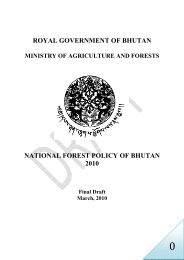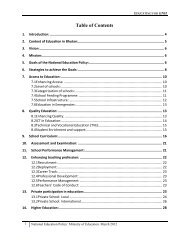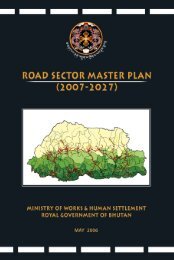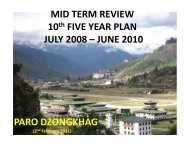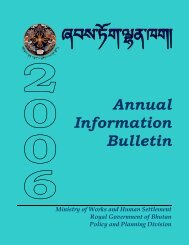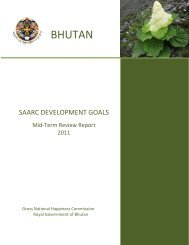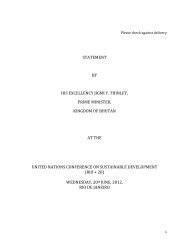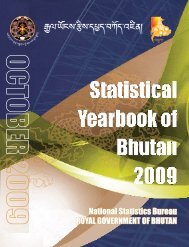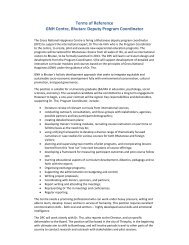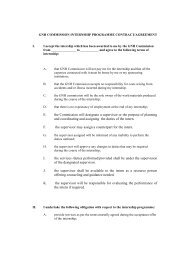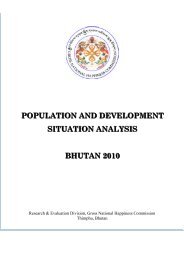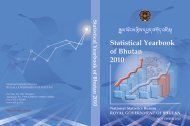COUNTRY BACKGROUND - Gross National Happiness Commission
COUNTRY BACKGROUND - Gross National Happiness Commission
COUNTRY BACKGROUND - Gross National Happiness Commission
Create successful ePaper yourself
Turn your PDF publications into a flip-book with our unique Google optimized e-Paper software.
Renewable Natural Resources<br />
the shortage of suitable land. This can be achieved through the introduction of new cropping patterns to improve<br />
soil fertility, such as incorporation of legumes into the farming system. Under the IHDP, a Horticultural section will<br />
be established within the Research and Extension Division, to provide assistance to producers in the form of<br />
research, extension and marketing support. The Potato Development Programme will be integrated into the IHDP<br />
and Regional Plans.<br />
Research Research<br />
17.61 Research programmes will be strengthened and expanded to examine the constraints to increasing food<br />
production in all 5 agro ecological zones. Irrigation, mechanisation and post harvest losses research will be<br />
integrated into the research programme. Greater participation of farmers and extension agents in on-farm testing<br />
will ensure that research is relevant to farmers' needs and higher adoption rates. The DOA will pay more attention<br />
to the integration of fodder and other animal husbandry considerations into arable production systems. The<br />
integration of all three Departmental research programmes will be the subject of a joint RGOB/ISNAR review.<br />
ExtensionExtension<br />
17.62 The extension service will be improved, largely at the Regional and Dzongkhag level, through training of<br />
staff and farmers, establishment of Regional Training Centres, upgrading of extension facilities, and improvements<br />
in information and publications. Extension methods will focus more on farmer participation in problem solving and<br />
transfer of technology at the farm level. This will require an expansion in the number of extension agents to 400,<br />
an increase of 167, and will provide a Extension Agent to farmer ratio of 1:150. The output of the <strong>National</strong><br />
Agricultural Training Institute at Paro and the new <strong>National</strong> Resources Training Institute at Lobesa will be<br />
increased from 20 to 25 per year to provide for the increase.<br />
Seed Production and DistributionSeed Production and Distribution<br />
17.63 With the wider adoption of new technology, it will become all the more necessary to produce and distribute<br />
improved seeds and planting materials. The production and distribution will be decentralised to reduce transport<br />
costs and wherever possible, farmers will be contracted for seed multiplication and private sector retailers will be<br />
encouraged to sell seeds to farmers.<br />
Input Delivery SystemsInput Delivery Systems<br />
17.64 The adoption of new technology will require increased supplies of other agricultural inputs such as<br />
fertilisers. This will be facilitated through the expansion of storage facilities and improvements in the management<br />
of the revolving funds operated by Dzongkhag extension staff.<br />
Plant Protection ServicesPlant Protection Services<br />
17.65 The Plant Protection Services will be responsible for research based on the Integrated Pest Management<br />
concept, including pathology, entomology and other plant protection research. The Plant Protection Service will<br />
provide advisory services to other units within the DOA and to farmers through the training of farmers and<br />
extension staff. The services will be decentralised through the establishment of Regional Plant Protection Centres in<br />
Tashigang and Geylegphug. Plant protection chemicals will continue to be provided through the service and to<br />
discourage indiscriminate, environmentally damaging use, subsidies will be reduced. Pesticide legislation and plant<br />
quarantine guidelines will be drawn up.<br />
Irrigation DevelopmentIrrigation Development<br />
17.66 Activities in the 7FYP will be based on the Irrigation Sector Study, which will have been completed by the<br />
end of the 6FYP. The emphasis of irrigation development will be on rehabilitation of existing schemes, examination<br />
of new materials and technologies, exploration of groundwater potential for use in irrigation and training of farmers<br />
in project planning and management skills, to encourage greater involvement of farmers in the operation of the<br />
schemes, particularly through formation of Water Users Associations.<br />
Farm MechanisationFarm Mechanisation<br />
13



